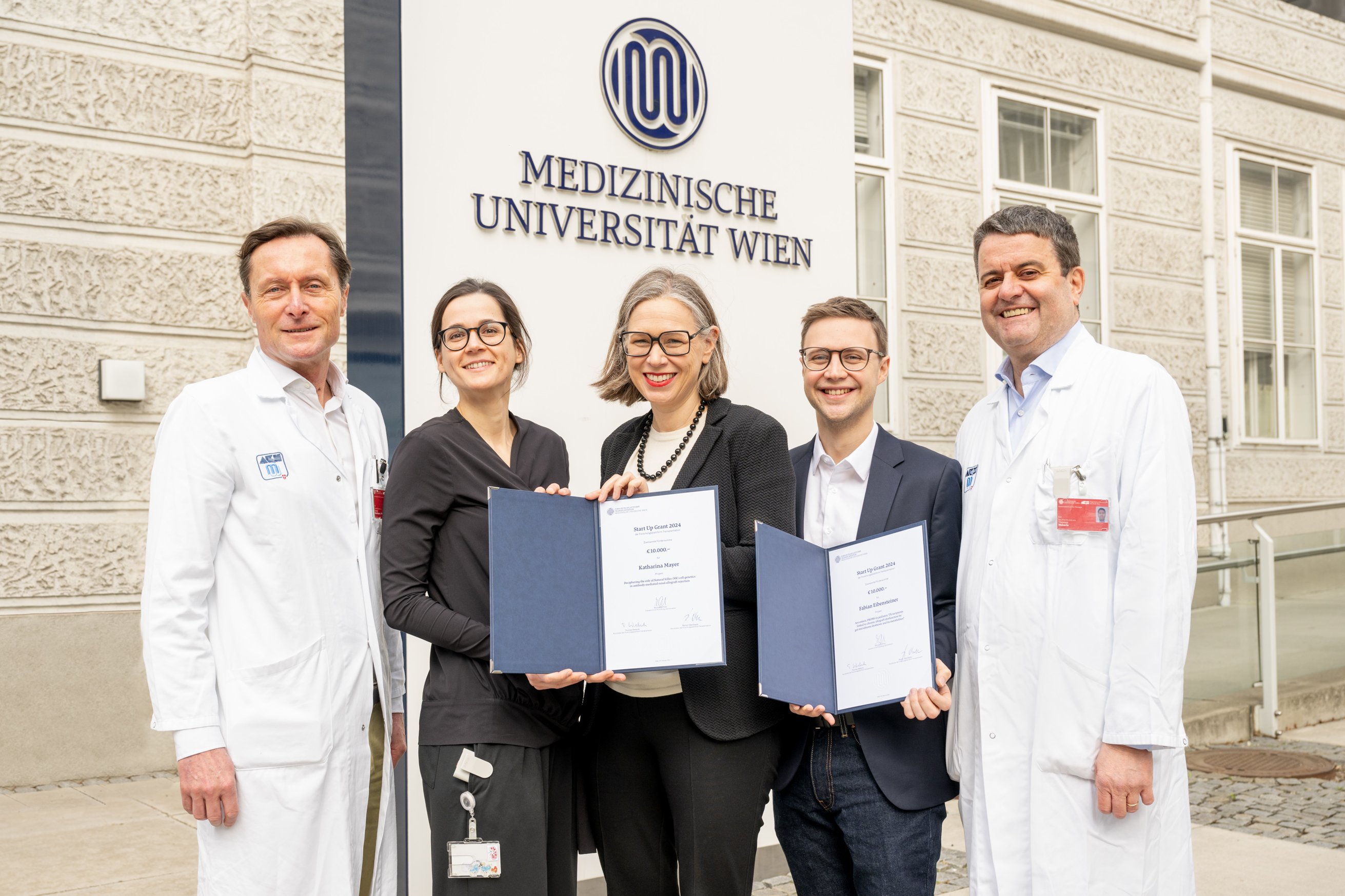
(Vienna, 26 February 2024) The Transplantation Research Platform of the Medical University of Vienna has awarded two "Start-up Grants" to promote young scientists in the field of transplant research. Katharina Mayer and Fabian Eibensteiner receive funding for their projects on kidney transplants.
The grants are intended to generate new research findings that will serve as the basis for future acquisition of third-party funding. The awards were presented by Michaela Fritz, Vice-Rector for Innovation and Research, and the coordinators of the Transplantation Research Platform, Rainer Oberbauer and Thomas Wekerle.
About Katharina Mayer's project
Natural killer cells (NK cells) are an important trigger of alloimmune damage after kidney transplantation. The activation of NK cells is the result of a delicate interplay between inhibitory and activating signals via different receptors. The current project will investigate functional single nucleotide polymorphisms that determine the function and/or expression of key activating and inhibitory NK cell receptors (i.e., Fc gamma receptor IIIA [FcγRIIIA], NKG2C, NKG2D, and killer inhibitory receptors) in the context of donor-specific antibody-positive renal transplant recipients. We hypothesize that genetic variants of NK cells may significantly influence the occurrence of rejection reactions, rejection activity and long-term survival of allografts.
About Katharina Mayer
Katharina Mayer completed her doctoral studies at the Medical University of Vienna in 2016. She completed her doctoral studies (N094) at the Institute of Immunology and investigated the metabolic regulation of T cell differentiation and function (supervisor: Gerhard Zlabinger). Since 2019, Katharina Mayer has been working in the Division of Nephrology and Dialysis at the Department of Internal Medicine III. Her current research projects focus on antibody-mediated rejection of kidney transplants.
About Fabian Eibensteiner's project
In Europe, approximately 5 to 10 children per million people suffer from chronic kidney disease, which leads to end-stage renal failure and subsequent kidney transplantation. Despite significant progress in short-term outcomes, long-term graft failure remains common and the main causes include lack of adherence and subclinical rejection due to alloimmunity.
In a small clinical pilot, Fabian Eibensteiner developed and used an electronic patient-reported outcome (ePRO) system to identify a subset of pediatric kidney transplant recipients with significantly poorer graft function based on gastrointestinal symptom clusters (e.g. diarrhea-associated symptoms).
Diarrhea is a common but consistently neglected complication of kidney transplantation and is often considered merely an unavoidable side effect of immunosuppressive drugs. Current literature suggests that the gut microbiome plays an important role in the development of chronic allograft dysfunction, possibly by altering the host plasma metabolome, including bile acid synthesis.
The aim of Fabian Eibensteiner's project is therefore to prospectively link changes in the composition of the gut microbiome and associated changes in microbiome-derived metabolites, particularly bile acids, to poorer long-term graft function in pediatric renal transplant recipients with or without symptoms of post-transplant diarrhea (as indicated by ePROs and patient history).
About Fabian Eibensteiner
Fabian Eibensteiner is a resident and PhD student in the Program for Organ Failure, Replacement and Transplantation (POET) and works in Michael Böhm's clinical research group in the Division of Pediatric Nephrology and Gastroenterology and Klaus Kratochwill's translational research group at the Department of Pediatrics and Adolescent Medicine. He completed his medical studies at the Medical University of Vienna in 2019. Fabian Eibensteiner is actively involved internationally in an upcoming European guideline on immunosuppression after pediatric kidney transplantation, as well as ESOT Basic Science Board Member and Transplant International Editorial Fellow since 2023. He was also awarded the Physician Researcher Scholarship earlier this year.